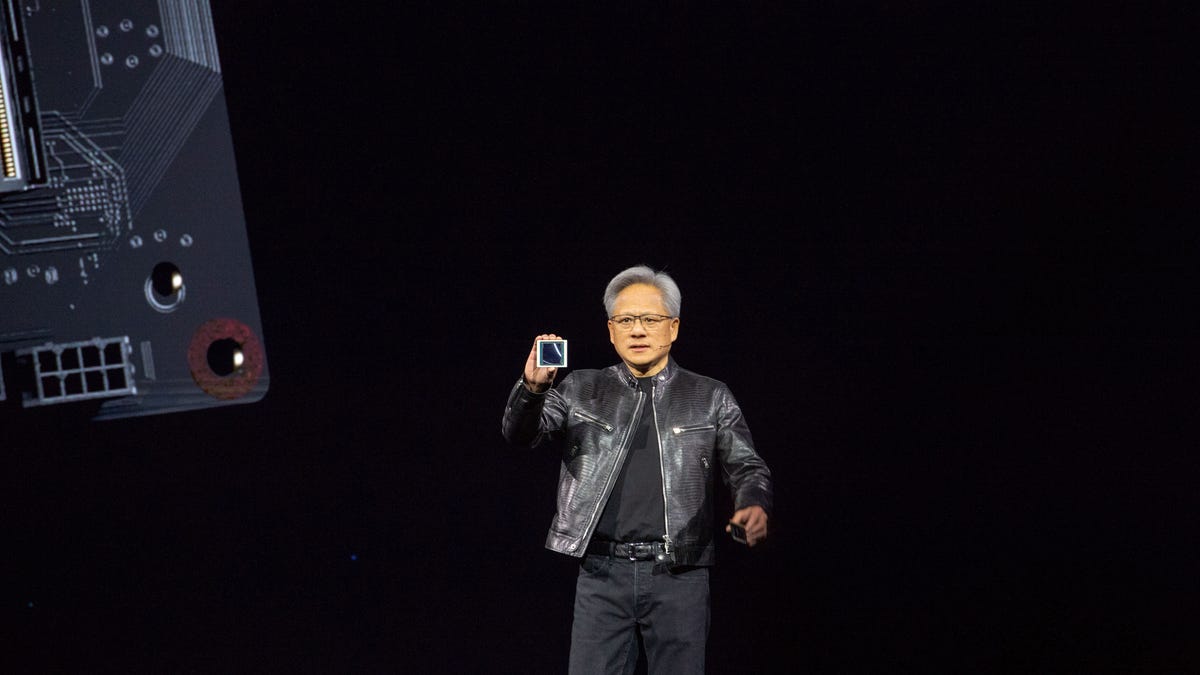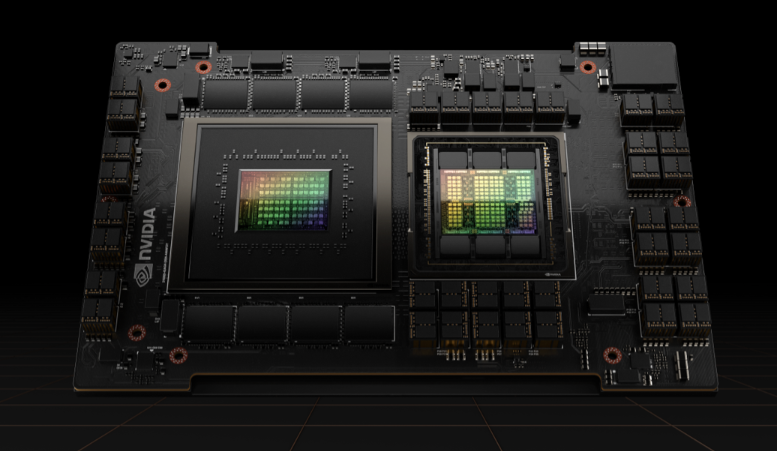
Nvidia reportedly delays its next AI chip due to a design flaw
/cdn.vox-cdn.com/uploads/chorus_asset/file/11447597/acastro_180529_1777_nvidia_0002.0.jpg) ]
]
Nvidia has reportedly told Microsoft and at least one other cloud provider that its “Blackwell” B200 AI chips will take at least three months longer to produce than was planned, according to The Information. The delay is the result of a design flaw discovered “unusually late in the production process,” according to two unnamed sources, including a Microsoft employee, cited by the outlet.
B200 chips are the follow-up to the supremely popular and hard-to-get H100 chips that power vast swaths of the artificial intelligence cloud landscape (and helped make Nvidia one of the most valuable companies in the world). Nvidia expects production of the chip “to ramp in 2H,” according to a statement that Nvidia spokesperson John Rizzo shared with The Verge. “Beyond that, we don’t comment on rumors.”
Nvidia is now reportedly working through a fresh set of test runs with chip producer Taiwan Semiconductor Manufacturing Company, and won’t ship large numbers of Blackwell chips until the first quarter. The Information writes that Microsoft, Google, and Meta, have ordered “tens of billions of dollars” worth of the chips.
 ]
]
In This Story NVDA MSFT META GOOGL TSLA AAPL GOOGL BRK.A
Nvidia shares fell sharply in pre-market trading — about 13% — and remained down by around 8% after the market opened on Monday. The company and its Big Tech peers dragged the Nasdaq and put the tech-heavy index on track to have its worst day since March 2020.
Microsoft turns the blame back on Delta for the global IT outage CC Share Subtitles Off
English view video Microsoft turns the blame back on Delta for the global IT outage
Microsoft turns the blame back on Delta for the global IT outage CC Share Subtitles Off
English Microsoft turns the blame back on Delta for the global IT outage
The reason behind Nvidia’s decline was a report over the weekend claiming that its newest AI chips in its Blackwell series are delayed due to design flaws. The Information reported Saturday, citing an unnamed Microsoft employee, that Nvidia told Microsoft about the delay, which could set back deliveries by three months or more.
Advertisement
The first Blackwell chip was unveiled by Nvidia CEO Jensen Huang in March. Five times faster and more powerful than its predecessor — Nvidia’s already-very-powerful, $40,000 H100 chip — the world’s largest tech companies such as Meta, Google, and Microsoft have lined up to buy Blackwell chips and have already spent tens of billions of dollars. Delays to Blackwell’s release would have major implications for the companies, which rely on the AI chips to run AI software. Left without their hardware orders, companies may face a slowdown as they race to develop the latest AI software tools and chatbots.
Advertisement
Nvidia is facing another, unrelated snag, too. Officials at the Department of Justice are reportedly investigating complaints from Nvidia’s rivals for allegedly abusing its dominance of the AI chip market.
Advertisement
Other tech companies whose stocks suffered Monday included Meta, Microsoft, Google, Tesla and Apple — which all sank for various reasons. Apple shares, for example, fell after Warren Buffett’s Berkshire Hathaway halved its stake in the company. Google shares have been on the decline since Alphabet reported earnings — and hefty AI spending — two weeks ago.
]
NVIDIA has discovered “design flaws” in its upcoming series of AI chips that may push their release back at least three months, The Information reports. The company has reportedly started notifying customers of the delay, including Microsoft. Large orders of the new Blackwell chips were initially slated to start shipping sometime this year, but sources told The Information that they’re now not expected until early 2025. In addition to Microsoft, the publication reports that Google, Meta and other major companies have placed bulk orders of the Blackwell chips that are collectively worth “tens of billions of dollars.”
NVIDIA announced the Blackwell series chips back in March, touting performance boosts of up to 30 times what’s achieved by its flagship H100, which serves as the backbone for some of today’s biggest AI systems. The company at the time also said the Blackwell chips could reduce “cost and energy consumption by up to 25x.” But according to The Information, citing sources involved with the Blackwell chip, “design problems arose unusually late in the production process.”
NVIDIA and its chip manufacturer, Taiwan Semiconductor Manufacturing Company, are now doing test production runs to get to the bottom of the issues, according to The Information, which reports that the first big shipments may not go out until the first quarter.
 ]
]
NVIDIA Reportedly Delays Launch of Next-Gen AI Chips Amid Design Flaw
The business world is increasingly relying on AI to be the next big technological advancement, and NVIDIA is one of the key players that is powering this revolution.
With its market capitalization hitting $3 trillion earlier this year, the California-based chip manufacturer has witnessed a meteoric rise since the rise of GenAI. NVIDIA’s revenue has surged dramatically, increasing by 262% year over year, highlighting the massive demand for its AI chips. However, the remarkable rise of NVIDIA might be experiencing a serious obstacle.
According to a report by The Information, NVIDIA AI chips will be delayed by three months or more due to design flaws that were discovered “unusually late in the production process.”
Customers who have ordered the new Blackwell flagship line of chips were expected to receive their shipments later this year but now may have to wait until 2025. The delay is expected to cause major disruption for customers such as Google, Microsoft, and Meta who already ordered tens of billions of dollars worth of NVIDIA chips.
Several NVIDIA customers are expected to launch new AI products and set up data centers by early next year, and this delay can cause significant disruption to their plans.
Google is estimated to have placed an order of more than 400,000 GB200 chips. Meta has also placed a similar order, while Microsoft wants at least 55,000 chips for OpenAI by the first quarter of next year.
The Blackwell AI chips are the successor to the hugely popular NVIDIA H100 chips, which are powering the majority of GenAI applications around the globe. NVIDIA unveiled the Blackwell GPUs in March, claiming they deliver a performance boost of up to 30 times compared to the H100 while reducing energy consumption by as much as 25% on some workloads.
The design flaw was reportedly identified by NVIDIA’s chip producer Taiwan Semiconductor Manufacturing Company (TSMC). A fresh set of test runs are being conducted on the AI chips.
According to The Information, the design flaw is with the processor die that connects the Blackwell GPUs on a single NVIDIA GB200 Superchip. NVIDIA is now working on redesigning the die and will likely need a few months before it can move to production testing with TSMC.
There are reports that NVIDIA is considering producing a single GPU version of the Blackwell series to fulfill its commitment to some customers. However, the performance impact of such a design would be risky.
NVIDIA may prefer to delay the shipments rather than risk shipping out faulty or underperforming products, which is what appears to have happened with Intel’s 13th and 14th Gen Core processors. The instability issues of the Intel processors have plagued gamers since December 2023 and have become a major headache for the tech giant.
While NVIDIA may be able to afford the delay, any performance failures of its highly anticipated Blackwell chips could be catastrophic. Not only would it be a disaster for its reputation, but also be extremely costly.
A single GB200 Blackwell superchip can cost up to $70,000, while a complete server rack can cost more than $3 million. Given the volume of chips and servers NVIDIA has committed to producing, any issues with the Blackwell chips could have severe financial repercussions for the company.
The delay in the AI chip arrives as NVIDIA faces another setback. The chip manufacturer is subject to investigation from the U.S. Department of Justice over its AI practices. The investigation is probing into claims that NVIDIA unfairly pressured cloud computing companies to buy its AI chips, and is also exploring potential antitrust violations related to NVIDIA’s acquisition of the AI startup Run:ai.
Several of NVIDIA’s customers are investing in hardware research to build their own AI products in-house. As a result, NVIDIA must minimize the impact of the AI chip delay to maintain its leading position in the market. There is a lot at stake for NVIDIA, and it must carefully navigate these challenges to ensure it continues to dominate the AI hardware industry.
Related Items
NVIDIA Prepares New AI Chip for China Amid Ongoing US Export Controls
Google’s Controversial AI Chip Paper Under Scrutiny Again
Nvidia’s Superlove: First Superchip, Now Supermode
回到上一頁